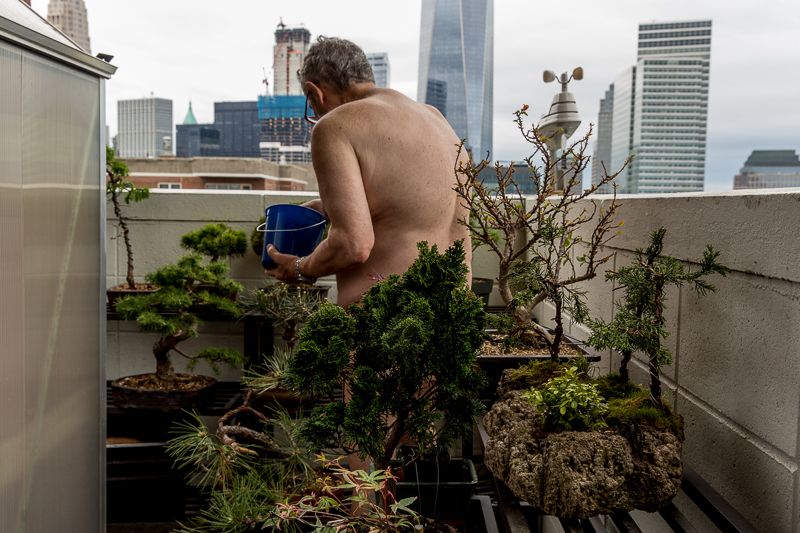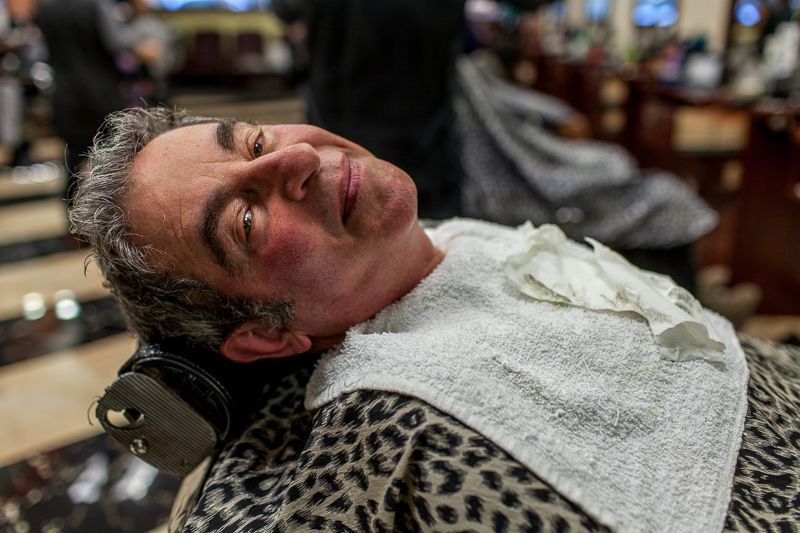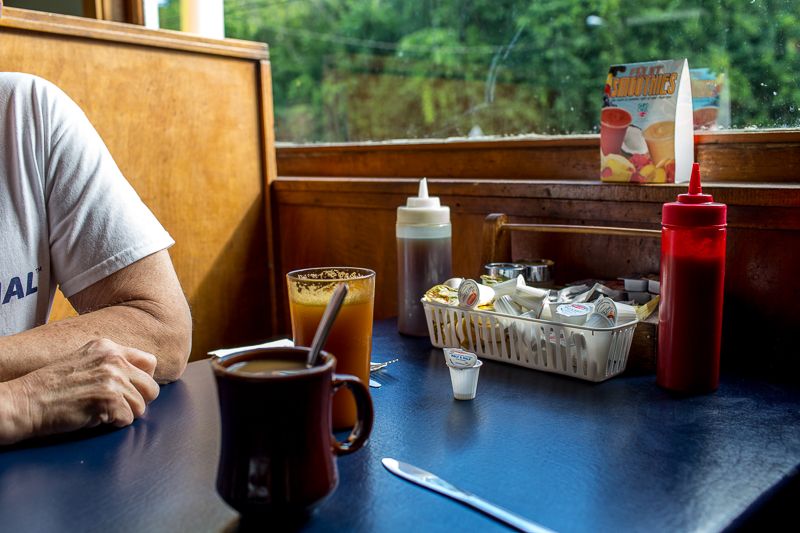blog
Interview with photographer Susan Rosenberg Jones

Joel on the Terrace
Sarah Hadley: How did you first become involved in photography and what led to you working in this medium as an artist?
Susan Rosenberg Jones: I’ve been photographing with intention since I was a child. I must have been about 9 years old and a neighbor, who happened to be a school teacher, noticed my interest and gave me a couple of photography “how to” books – such a lovely thing for her to do. Later, as a teenager, I found a wonderful drop-in community center in downtown Boston where kids were taught – for free – developing and printing, and they gave us loaner cameras to use. After college, when I moved to New York City, I remained a committed photographer, and made a decision to make my living doing other things while pursuing photography as my art practice.
Sarah Hadley: The current issue of F-Stop Magazine includes images from your project “Second Time Around”. Can you tell us about this project? What led to this work?
Susan Rosenberg Jones: I was busy shooting and editing environmental portraits of our neighbors for my project “Building 1”. Joel and I had recently married and I was seeing aspects of his behavior I found delightful, humorous, or just appealing, and was photographing him around the house, as moments revealed themselves. Then I took a critique class at ICP, called “The Intimate Portrait”, with Jen Davis. While in that class, this body of work began taking shape.
Sarah Hadley: Can you discuss your process for making these images?
Susan Rosenberg Jones: The first year or two, I would have the camera ready and would photograph him in the apartment, cooking, tending to his plants, napping, shaving. Then, as I began editing, I began photographing him outside the house, in everyday or travel situations, and weaving certain images into the mix. Lately, I’ve become more discerning, as I don’t want to repeat myself. So now I preconceive images based on planned outings or activities where I know I’ll want to photograph. Having said that, I continue to keep the camera close at home, as visual moments still arise that I can’t resist capturing.

At the Barber
Sarah Hadley: Do you have a favorite image in this series? If so, which one and why does it speak to you the most?
Susan Rosenberg Jones: I don’t think I have a favorite image, but one that comes to mind is so intimate that I find it powerful – it speaks to me. It’s the one where he’s at the barber in the chair, just after a shave, and he’s wearing the leopard print smock and a towel, looking straight at me with an expression that is tantamount to “after sex face”.
Sarah Hadley: How do you feel this work relates to the theme of the Human Body?
Susan Rosenberg Jones: Joel likes to be naked at home. I photograph him in his every day state of being. He’s completely comfortable in his own skin; my project celebrates the human body and its beauty no matter the age of the person.
Sarah Hadley: Is this project ongoing or do you have other projects that you working on currently?
Susan Rosenberg Jones: This project is ongoing, because Joel remains a lovable and fascinating subject. I’m still working on “Building 1”, and trying to expand the project by partnering with other photographers working on the issue of communities losing diversity in this country. Now I am beginning a new new body of work, also personal and also very close to my heart, focusing on widows and widowers. People die at all ages, some after illnesses, others abruptly. Having been through the caretaker and mourning process, I want to explore how others deal with the journey of dying, death, loss, mourning and recovery.

Joel in the Shower
Sarah Hadley: How do you feel “Second Time Around” relates to other work or projects you have done in the past or are currently working on?
Susan Rosenberg Jones: “Second Time Around” is mostly shot at home. Although I’m not in the photos (I tried to insert myself into some images but it didn’t work and wasn’t necessary), I am very much “in” the images, at home with Joel. Other projects I’ve made, such as “Anita and Paul” (a narrative portrait of a long-married couple), and “Building 1”, are about home and community and the way my subjects feel grounded. I’m hoping to explore that feeling of security that widows and widowers have to struggle to maintain after their loved one dies.
Sarah Hadley: Why do you photograph? What compels you to make the images you create?
Susan Rosenberg Jones: I see patterns and light, and soul in people, places and things. I read a lot of character driven fiction; when the author expresses intimate feelings about a situation – that’s something I strive to capture with my camera. Sometimes I feel better equipped to explore an idea with my camera, and then examine it later in editing and sequencing. I find it fascinating to look at my photographs after I shoot, then a few days later, then months…it’s not just the memory, it’s looking at them with fresh eyes every time – I just love the process.
Sarah Hadley: Where does your inspiration come from and how do you choose how/when/what to photograph?
Susan Rosenberg Jones: Sometimes it’s at home when the light in my apartment changes, sometimes it’s an event that’s planned where I know I’ll want to shoot, other times I meet someone whom I wish to photograph for no particular reason. Real life experiences hit me as ideas to explore photographically, and those ideas just come. I think it’s being open to whatever piques my interest.
Sarah Hadley: Your work is about your own life and struggles and you portray it in an open and vulnerable way. Did this evolve or were you always this honest or able to put yourself out there?
Susan Rosenberg Jones: I think I’ve always been pretty open and vulnerable. Life is short so we may as well live as honestly as possible. Being open allows me to meet and interact with great people, and I enjoy going deep.

At the Diner
Sarah Hadley: How has the positive feedback and accolades you have received for this work affected you or your work?
Susan Rosenberg Jones: The positive feedback has been much appreciated, and I must say, motivating. I’ve received emails from women who saw the work and related to my story, both photographers and non-photographers. It’s been a blessing that my work has touched people.
Sarah Hadley: Have you experienced any negative backlash from your series and how has it affected you or your work?
Susan Rosenberg Jones: No.The response has been positive.
Sarah Hadley: What do you hope people experience or feel when they look at these or any of your photographs?
Susan Rosenberg Jones: I hope that they relate to the people in the photographs, that they recognize their own conflicts or emotions, that they find some humor or joy, or food for thought.
Sarah Hadley: What photographers or other artists inspire you?
Susan Rosenberg Jones: Oh, so many. Helen Levitt. Cartier-Bresson. Robert Frank. Edward Hopper. Georgia O’Keefe. Phil Toledano, Sally Mann. I’ve also had some inspiring teachers who are superb photographers: Amy Arbus, Karen Marshall, Martine Fougeron, Natan Dvir, Jen Davis, Jennifer McLure, Amy Touchette.
Sarah Hadley: How would you describe your work to someone viewing it for the first time?
Susan Rosenberg Jones: My work is about people at home, with their family and friends, and in the larger community.
Sarah Hadley: What defines a good photograph for you?
Susan Rosenberg Jones: A good photograph has graphic balance, interesting light, and some element that causes the viewer to react emotionally.

Joel Shaving
Sarah Hadley: What is your process for working on a project? Do you preconceive of your images in your head, or do you have a concept or idea and shoot until you feel it has been realized?
Susan Rosenberg Jones: I have an overall concept – then I shoot and shoot until I have enough images to print out and move around. Once I see them in a sequence, I have a better idea where it’s going, and what I need to do to bring out the essence of what I’m trying to say.
Sarah Hadley: Has living in New York affected your work at all?
Susan Rosenberg Jones: Yes, it has. I love the city, and derive a lot of energy from its pace. I love the way New York neighborhoods are essentially small towns. I get a kick out of the street life, and love looking at people’s public behavior on the subway, in elevators, in museums. I observe a lot of body language and when I photograph I pay particular attention to that.
Sarah Hadley: Is there anything else you would like to tell us about your work or life that would inform us about your work?
Susan Rosenberg Jones: I’m basically an optimist and love living in this world, although I’m disturbed by all the unnecessary suffering and unjust cruelty that occurs everywhere. I’m grateful to have experienced lots of laughter and love, and will continue to delight in photographing people and places that inspire me, hopefully for years to come.
For more of Susan Rosenberg Jones’ work see the current issue of F-Stop: www.fstopmagazine.com or visit her website: www.susanrosenbergjones.com
Location: Online Type: Featured Photographer, Interview
Events by Location
Post Categories
Tags
- Abstract
- Alternative process
- Architecture
- Artist Talk
- artistic residency
- Biennial
- Black and White
- Book Fair
- Car culture
- Charity
- Childhood
- Children
- Cities
- Collaboration
- Community
- Cyanotype
- Documentary
- Environment
- Event
- Exhibition
- Faith
- Family
- Fashion
- Festival
- Film Review
- Food
- Friendship
- FStop20th
- Gender
- Gun Culture
- Habitat
- Hom
- home
- journal
- Landscapes
- Lecture
- Love
- Masculinity
- Mental Health
- Migration
- Museums
- Music
- Nature
- Night
- nuclear
- p
- photographic residency
- Photomontage
- Plants
- Podcast
- Portraits
- Prairies
- Religion
- River
- Still Life
- Street Photography
- Tourism
- UFO
- Water
- Zine

Leave a Reply